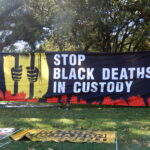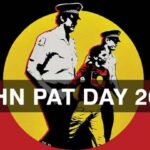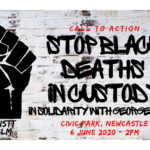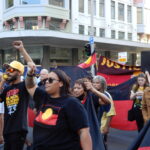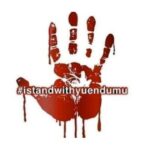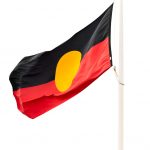Police Fatally Shoot Another First Nations Person, as Custody Death Injustice Persists
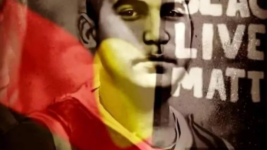
Australian police have killed yet another First Nations person. This time it was 27-year-old Aubrey Donahue, who was shot down in the northern Queensland town of Mareeba by specialist law enforcement officers, following a four-hour siege.
At 11.30 am on Saturday, 25 March, Queensland police responded to a call about a 27-year-old threatening to self-harm and refusing to allow a woman to leave a premises located on Love Street in Mareeba. And at 3.30 pm, police shot Donahue who was allegedly approaching holding a knife.
But during a town meeting on the day following, Donahue’s brother-in-law Dion Bermister asserted that the man was rather holding his phone and gesturing to give himself up: a claim supported by Steven Douglas, who, as the last person to speak to Aubrey, understood he was going to surrender.
The young man’s death adds another name to the list of over 540 First Nations deaths in the custody of either police or corrections since the 1991 release of the Royal Commission into Aboriginal Deaths in Custody (RCIADIC) final report.
And questions are now being asked as to why specialist officers found it necessary to fire upon Aubrey a total of four times, even if he was armed with a knife, while charges of racism and excessive force are further being laid at the feet of the killer police.
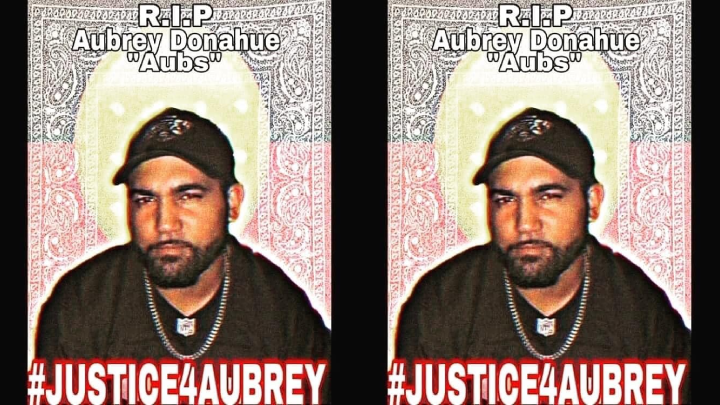
“Black fellas lives matter”
“That’s just not on, what they did. It is very sad. There was no need for that – they could have just tasered him or something like they do with other people, but for our people, it’s something different,” The Express reports Pastor Vincent Mathieson saying at the 26 March town meeting.
“It’s got to stop – we’ve got to do something as a community – he was one of our kids. We saw him grow up. It should not have happened, another young life lost,” the religious leader added.
Key issues around the shooting involve no officer having captured any close-range footage of the incident on their body-worn cameras, despite numerous being present, as well as why police didn’t apply the use of tasers or shoot in a manner that wouldn’t have proven fatal.
Further questions involve why, after a four-hour standoff, there were no mental health professionals on the ground having been engaged in deescalating the situation that only involved threats of self-harm, along with a dearth of Aboriginal liaison officers deployed to the scene.
Indeed, Mareeba, a small town west of Cairns, has a closeknit community, with local police well aware that Aubrey struggled with mental health. And despite being well acquainted with the young man’s family, officers also failed to engage them during their efforts to see him surrender.
A flawed process
The “independent” officers of the Queensland Police Service Ethical Standards Unit have been investigating the matter on behalf of the state coroner, who will hold an inquest into the custody death, while the Queensland Crime and Corruption Commission is also looking into the shooting.
The RCIADIC handed down 339 recommendations on how to prevent further Aboriginal deaths in custody, with the 7th recommending that state coroner’s inquire into all custody deaths. And this is one of only a few of the recommendations that authorities have acted upon.
However, at least in NSW, the coronial process has come under criticism for resulting in a lack of any real justice in terms of criminal charges laid against any corrections or law enforcement officers. Although there has been one recent significant outcome that did see a prison officer charged.
Despite the RCIADIC’s comprehensive suggestions, over 500 more deaths have transpired since their release, and no police officer or prison guard has ever been convicted in relation to any of these deaths, which, when they don’t involve a direct killing, are often the result of neglect of duty of care.
The NSW inquest that was cut short saw an unnamed Corrective Services NSW officer charged with murder over his having shot Wiradjuri man Dwayne Johnstone in the back, as he attempted to flee whilst handcuffed and shackled, which resulted in a jury being unable to agree upon a verdict.
While the most high-profile Aboriginal death in custody case of late – the 2019 shooting of Warlpiri teen Kumanjayi Walker by NT constable Zachary Rolfe, with two shots fired point-blank into the young man’s side whilst he was held down – saw the acquittal of the officer involved.
Extreme prejudice
A crowd of community members gathered before the Queensland Supreme Court last Friday, to protest against another killing of an Indigenous person by Australian law enforcement, which has always held extreme prejudice towards First Nations people since its inception.
Event organiser, Victoria Van Schie, who’s related to Donahue, told The Courier Mail that despite assertions that a domestic violence incident was occurring at the house where Aubrey was shot, nothing in that regard was taking place, and further, the man was not holding a knife on being shot.
Queensland Police Service acting deputy commissioner Mark Whelan told reporters on Friday that no close-range footage of the incident was captured as specialist officers don’t wear body cameras. However, footage obtained by other officers is now being considered by investigators.
Indeed, there has been an uptick in attention given to deaths in custody since a rise in the Black Lives Matter movement in 2020, and the 30 year anniversary of the RCIADIC the year following.
Yet, there’s also been an accompanying increase in the number of custody deaths over these years.
And even with recent cases involving officers charged with murder marking a modicum of progress in the campaign to stop Black custody deaths, the most common outcome to expect in regard to Aubrey’s death is that while a coroner will deliberate upon it, all officers involved will walk free.


